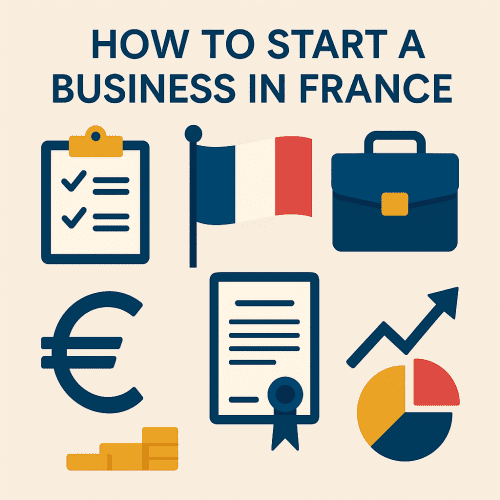
France stands as one of the most attractive destinations in Europe for entrepreneurs. With its strategic location, developed infrastructure, and business-friendly reforms, the country has become a hub for startups, SMEs, and international companies alike. This guide addresses the most pressing questions about how to start a business in France, especially if you're a foreigner considering entry into the French market.
Why Start a Business in France?
If you’re asking “why start a business in France,” the answer lies in a blend of economic opportunity and institutional support. France offers:
1. Access to the EU market
2. Strong infrastructure
3. Support for innovation and startups (like the French Tech program)
4. Government incentives for investment and hiring
For international entrepreneurs, France provides a relatively stable legal and economic environment.
How to Start a Business in France
When it comes to how to open a business in France, the process involves key steps: choosing a structure, registering the business, and meeting compliance requirements. Whether you’re a resident or a foreigner, the core steps are the same.
Opening and starting a business in France are synonymous from a legal standpoint. The terminology may differ, but the steps include:
-
Deciding on the business structure (more on this below)
-
Registering the entity
-
Complying with local tax and legal requirements
-
Opening a French business bank account
-
Filing legal notices of incorporation
If you're not fluent in French, consider using a certified French translation service like PoliLingua to handle administrative paperwork and legal filings.
How to Register a Business in France
When it comes to how to set up a business in France, the requirements differ depending on your legal structure:
Common Legal Structures:
-
Micro-entrepreneur: Simplified process, best for freelancers or small operations.
-
SARL (Société à responsabilité limitée): Limited liability company.
-
SAS (Société par actions simplifiée): Flexible shareholding structure, ideal for startups.
-
SA (Société Anonyme): Suited for larger firms, minimum capital €37,000.
Registration Steps:
-
Draft Articles of Association
-
Open a business bank account
-
Deposit share capital
-
Publish a notice in a legal journal
-
Submit registration to the Centre de Formalités des Entreprises (CFE)
-
Obtain a SIREN number and register for taxes
Every legal step requires documentation in French, and mistakes can delay your registration. For entrepreneurs managing paperwork remotely, reliable certified document translation services online can streamline the process and help avoid costly errors. PoliLingua’s French translation services ensure your documents are accurate and legally compliant.
How Difficult Is It to Start a Business in France?
Many entrepreneurs wonder: “how difficult is it to start a business in France?” While France has modernized its procedures, bureaucracy can still be complex, particularly for foreigners. The main challenges include:
-
Language barrier
-
Navigating multiple government platforms (tax office, INSEE, URSSAF, etc.)
-
Mandatory publication of business creation
-
Time-consuming paperwork if not familiar with the legal system
The process is easier with local legal or accounting help, and French-language accuracy is critical. This makes professional translation services not a luxury, but a necessity.
How to Start a Business in France as a Foreigner
France welcomes foreign entrepreneurs, but additional steps apply if you're from outside the EU/EEA:
Visas and Permits:
-
Long-Stay Visa (VLS-TS) for business creation
-
Talent Passport for high-growth project founders
-
Proof of sufficient funds and viable business plan
Other Considerations:
-
Your documents must be in French, while official translations are mandatory
-
You’ll need a physical business address
-
Setting up a local bank account may take time due to due diligence requirements
Additional requirements often include translating diplomas, transcripts, or professional certificates for visa and permit applications. Many entrepreneurs turn to experts in certified translation of academic transcripts and diplomas to make sure their qualifications are recognized by French authorities.
How Much Does It Cost to Start a Business in France?
“How much does it cost to start a business in France?” depends on your structure and business type. Estimated costs include:
| Expense | Estimated Cost (€) |
|---|---|
| Legal publication (mandatory) | 150–250 |
| Registration (RCS or RM) | 60–250 |
| Bank fees (for capital deposit) | 50–300 |
| Share capital (SARL/SAS) | From €1 upward |
| Legal/accounting assistance | 800–2500 |
| Translation of documents (per pg) | 25–60 |
If you are launching a business as a foreigner, factor in the cost of visa applications and certified translations.
How to Start a Food Business in France
A food business in France, whether a bakery, restaurant, or catering company, is subject to specific regulations:
Mandatory Requirements:
-
Hygiene training certification (Formation HACCP)
-
Premises must meet safety and sanitary standards
-
If serving alcohol: license acquisition (e.g. License IV)
-
Register with Chambre de Métiers et de l’Artisanat (CMA) for artisanal food businesses
All documentation must be in French. Health inspections are strict, and failure to comply can result in immediate closure. Beyond HACCP documents, technical materials like equipment manuals or staff training guides also need precise translation. Partnering with a tech-savvy translation company for code manuals and help desks ensures clarity and compliance with industry standards. Many restaurateurs rely on PoliLingua to translate HACCP documents and employee contracts.
France offers real opportunities to entrepreneurs but requires a serious commitment to due process and compliance. Key takeaways:
- Registration is straightforward but bureaucratic.
- Legal structure matters for liability and taxes.
- Foreigners face extra legal and translation challenges.
- Translation of your documents is not optional, it's required.
For multilingual business owners, the difference between compliance and rejection often comes down to accurate French translation. That’s why professional help like PoliLingua French translation services is essential to success.








